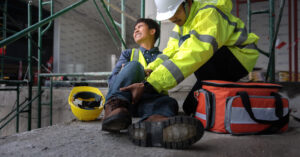
If you are working at a temporary or seasonal job in Georgia, you should know you have the same right to workers’ compensation benefits as any other employee. Just because you are not working permanently at a business does not mean you are not considered an employee. Most employees in Georgia are covered by workers’ compensation. If your employer tells you that you are ineligible for workers’ compensation after an accident simply because you’re a temporary or seasonal employee, talk to an attorney right away.
The Georgia workers’ compensation lawyers at Sherrod & Bernard, P.C., have more than 80 years of combined experience defending the rights of injured employees. Our in-depth knowledge of the Georgia workers’ compensation system has helped us secure significant compensation for our clients. We can assist you with every aspect of your case, from choosing the right doctor and filing your claim to maximizing your benefits and assisting with any appeals you may need. If you want to know more about how we can help you, contact our office for a free consultation.
Are Georgia Employers Required to Carry Workers’ Compensation?
According to information from the State Board of Workers’ Compensation, which oversees workers’ compensation in Georgia, most businesses with three or more employees are required to carry workers’ compensation insurance. When a business is required to carry workers’ compensation insurance, workers’ comp benefits are available for any employee, whether they are full-time or part-time.
Some workers do not qualify for workers’ compensation benefits under Georgia law. Among those classes of workers who do not qualify are:
- Certain agricultural workers
- Some corporate executives
- Railroad workers
- Domestic servants
- Employees of the state or federal government
- Independent contractors
Misclassifying temporary or seasonal employees as independent contractors is one of the most common ways businesses will attempt to prevent workers from claiming workers’ compensation benefits. However, just because your employer classifies you as an independent contractor, doesn’t necessarily mean you meet the requirements to be disqualified from obtaining workers’ compensation benefits. Talk to an attorney right away if your employer is trying to prevent you from filing a workers’ compensation claim.
What Are Some Common Seasonal Jobs that Could Be Covered by Workers’ Compensation?
 Some common seasonal or temporary jobs that are likely covered under Georgia’s workers’ compensation laws include:
Some common seasonal or temporary jobs that are likely covered under Georgia’s workers’ compensation laws include:
- Camp counselors – Children’s camps are generally busiest in the summer while students are out of school. Working outdoors puts camp counselors at risk of serious injury, especially if the camp is near a body of water.
- Carnival workers – Carnivals are typically summer or fall attractions, so carnival workers are typically hired on a seasonal or temporary basis. Setting up or tearing down rides or booths can involve a lot of physical strain, leading to accidents and injuries.
- Concert staff – While some concert venues are open all year, others are only open for certain seasons, so they rely on temporary workers. Accidents are common in crowded venues. Also, preparing for or cleaning up after a show can involve intense manual labor.
- Construction workers – If a contractor is in a hurry to complete a project, they may hire additional temporary workers to supplement their existing work crews. Construction is one of the most dangerous industries for workers because they are working with heavy machinery in chaotic environments.
- Marina workers – Boating is generally a summertime activity in Georgia, so marinas typically hire additional workers for their busy season. Working near the water puts marina workers at risk of drowning. Marina workers can also sustain injuries while working on boats at the dock.
- Retail workers – Many retailers hire additional workers to handle the holiday rush, but busy stores also mean there is a higher chance of an accident occurring. Slip-and-falls, muscle sprains and strains, and car accidents at work are common causes of retail injuries.
- Restaurant workers – Restaurant work is often temporary, especially for students who are on summer break. There are all kinds of potential safety hazards at restaurants, from sharp objects and wet floors to hot ovens and angry customers. Restaurant workers have some of the highest rates of workplace accidents.
- Watersports guides – Those with an outdoorsy, adventurous nature sometimes find themselves working as watersports guides in the summer. Working as a watersports guide carries a significant risk of drowning. Additionally, head injuries, muscle sprains and strains, and other injuries are also common.
Is It More Difficult for a Seasonal or Temporary Worker to Collect Workers’ Comp Benefits?
It is often a challenge for temporary or seasonal workers to collect workers’ compensation benefits. Employers may attempt to misclassify a temporary or seasonal worker as an independent contractor, making them potentially ineligible for workers’ comp benefits. Alternatively, an employer might simply tell an employee that seasonal or temporary workers are ineligible for workers’ comp benefits, which is generally not true.
Your duties and other factors determine whether you are considered a contractor under Georgia law, so it doesn’t matter what your employer says. Most businesses with three or more employees are required to carry workers’ compensation insurance, even if those employees do not work full-time.
How Does a Temporary Worker Submit Their Worker’s Compensation Claim?
The first step in any workers’ compensation claim is to notify your employer of your injury, which you should do in writing. At that point, they will either notify the State Board of Workers’ Compensation that you are making a claim, or you can submit the claim yourself. We recommend getting help from an attorney before submitting your claim.
Once your claim has been submitted, your employer’s workers’ compensation provider has 21 days to decide whether they will approve your claim. If your claim is approved, you will start receiving benefits shortly. Otherwise, you will need to appeal your denial if you wish to claim any benefits.
Contact a Georgia Workers’ Compensation Lawyer
If you are a temporary or seasonal worker in Georgia, do not let your employer unfairly deprive you of workers’ compensation benefits after an injury. Contact Sherrod & Bernard, P.C., today to speak with an experienced Georgia workers’ compensation lawyer.
